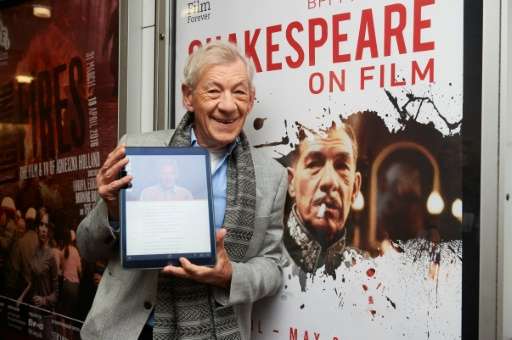British actor Ian McKellen poses for a photograph during a photo call in central London on April 22, 2016
A new iPad app intended to make William Shakespeare's works more accessible is being launched by actor Ian McKellen and director Richard Loncraine on Saturday, the 400th anniversary of the Bard's death.
The app users see actors reading out "The Tempest", facing the camera with no costume or staging as the text scrolls, and its developers said they hope eventually to cover all of Shakespeare's 37 plays.
"This is not a production. We're in our own clothes, the actors are not relating to each other. The person we're relating to is you, the person at the other end of the app," said McKellen, who worked with Loncraine on a production of "Richard III" 20 years ago.
"We're trying to help you," he said.
"Shakespeare did not mean you to read it. He wanted the actors to read it, learn it, put the script aside and speak it to the audience," he added.
"The Tempest" was chosen because it is Shakespeare's last play but also the one that appears first in a compilation of Shakespeare works put together in 1623—seven years after the famous playwright's death.
Users can pause the readings to click on notes whose level of detail can be adapted if the viewers are schoolchildren or university students.
Loncraine, who set up Heuristic Media, said the app "helps people to comprehend" Shakespeare but was "not meant to be a substitute" for watching a play.
"It was written 400 years ago so it's very, very difficult for modern audiences who haven't studied it," he said.
The programme "strips away elements that you don't need to understand the text," he said.
The filming took place over two days at Pinewood Studios near London, which were recently used for the latest instalment of "Star Wars".
The actors are all experienced Shakespeare hands, sitting side by side in front of the cameras and with a large prompter scrolling the text.
In September, Heuristic Media is planning to record four more plays—"Romeo and Juliet", "Macbeth", "Othello" and "Midsummer Night's Dream"—always with a prominent actor in the primary role.
"Shakespeare's work stays alive by evolving into new media," said Jonathan Bate, professor of English literature at Oxford University, adding that the new app was "true to Shakespeare".
The app is addressed mainly to students reading Shakespeare in the original language—an audience estimated by Loncraine at 56 million people.
But can also help adult audiences familiarise themselves with plays before going to the theatre.
McKellen said: "It's only when you get into the theatre that you'll get the real Shakespeare experience."
© 2016 AFP
























